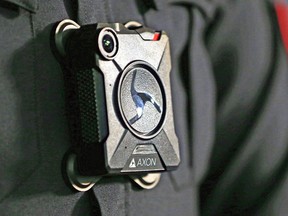B.C. municipalities have big cost concerns over rollout of body cameras to RCMP
Port Coquitlam officials say they want Ottawa to cover all the upfront body-camera capital costs and three years of operations they believe was promised.

Article content
With the rollout of body-worn cameras for front-line RCMP officers scheduled to start this year, municipalities that contract policing from the Mounties are calling on Ottawa to cover the full costs of the program.
Craig Hodge, a Coquitlam city councillor and co-chairman of the Union of B.C. Municipalities’ local government RCMP contract management committee, said there is significant concern that the $238.5 million promised by the federal government in 2020 for the body-camera program is running out quickly, and municipalities will see little of that money.
And going forward, cities and towns that contract with the RCMP will be on the hook for upgrades, replacement and maintenance of the body-worn cameras and computer servers, continuing software costs, possibly increased space costs, and increased staffing to store and manage the video footage, he noted.
Operating costs have been estimated at $2,000 to $3,000 per camera, which could go up, and the cost of policing is already significant for municipalities, up to 25 per cent of some municipal budgets, said Hodge.
On top of that municipalities have been hit with a major jump in RCMP pay and planned costly upgrades to 911 emergency call services.
“We don’t know the full costs,” Hodge said of the body-cam program. “It’s just passed down the line to the local government, and, so, that’s what really, really worries us.”
Among Canadian provinces, B.C. has the most RCMP officers contracted by municipalities, and the province itself, totalling about 6,000.
Just before Christmas, Port Coquitlam city councillors said they had had enough and wouldn’t pay for elements of the body-cam program. The item came up as a 2024 RCMP spending item for software maintenance and video storage, an estimated $218,563, in the city’s five-year capital plan.
Citing concerns over the downloading of costs, council quickly voted to remove the body-camera item, and spending on upgraded 911 services, until more was known.
“They make a decision in Ottawa, and we’re expected to follow through, but the money they put aside, it’s not there anymore,” Port Coquitlam Coun. Steve Darling said this week.
City officials say they want Ottawa to cover all the upfront capital costs and three years of operations they believe was promised.
In 2020, Prime Minister Trudeau announced he supported body-worn cameras for all police forces in Canada, as a solution to allegations of racism and brutality. It also has the support from B.C.’s police oversight agency.

Later in 2020, the federal government promised the $238.5 million spread over six years to buy the cameras for the RCMP and set up a system for collecting video, with an additional $50 million a year for maintaining the system when it’s complete.
In a written statement, RCMP officials in Ottawa said the $238.5 million fully funds the initiative until 2024-25, at which time municipalities will “contribute at the contract share.” That timing would leave communities like Port Coquitlam covering all costs almost immediately.
Public Safety Canada, the federal department responsible for the RCMP, declined to answer questions about costs and federal funding of the body-camera program.
RCMP officials at the provincial and municipal level in B.C., including in Surrey and Burnaby, and some municipalities, also had no body-camera cost information to share.
Some B.C. police detachments pointed to a police news conference they said was scheduled next week that might provide more information, which involves the RCMP, independent municipal police forces such as Delta, and the B.C. Association of Chiefs of Police.
The Delta police force has already started to deploy body-worn cameras and the City of Vancouver recently decided to do the same by 2025.
Hodge, the UBCM representative, said he was unaware of the news conference.
In a written statement, RCMP national spokeswoman Cpl. Kim Chamberland said a contract for the body-worn cameras and a digital evidence management service has been awarded to Motorola.
A field test involving multiple detachments in Nova Scotia, Nunavut and Alberta that will involve about 300 front-line officers is expected to start in March and last about two months, according to national and provincial RCMP officials.
Following the field test, a national rollout will take place over 12 to 18 months.
“Once complete, body-worn cameras will become the national standard for general duty front-line RCMP officers,” said Chamberland.
More news, fewer ads: Our in-depth journalism is possible thanks to the support of our subscribers. For just $3.50 per week, you can get unlimited, ad-lite access to The Vancouver Sun, The Province, National Post and 13 other Canadian news sites. Support us by subscribing today: The Vancouver Sun | The Province.


![VANCOUVER, BC - April 3, 2024 - West Broadway looking west from tower that is under construction at Broadway and Granville in Vancouver, BC, April 3, 2024. (Arlen Redekop / Postmedia staff photo) (Story by Dan Fumano) [PNG Merlin Archive]](https://smartcdn.gprod.postmedia.digital/vancouversun/wp-content/uploads/2024/04/png0403-tower-construction-8.jpg?quality=90&strip=all&w=232&sig=vUa6zTiEqOd-vi2lQwJAhw)


Postmedia is committed to maintaining a lively but civil forum for discussion. Please keep comments relevant and respectful. Comments may take up to an hour to appear on the site. You will receive an email if there is a reply to your comment, an update to a thread you follow or if a user you follow comments. Visit our Community Guidelines for more information.